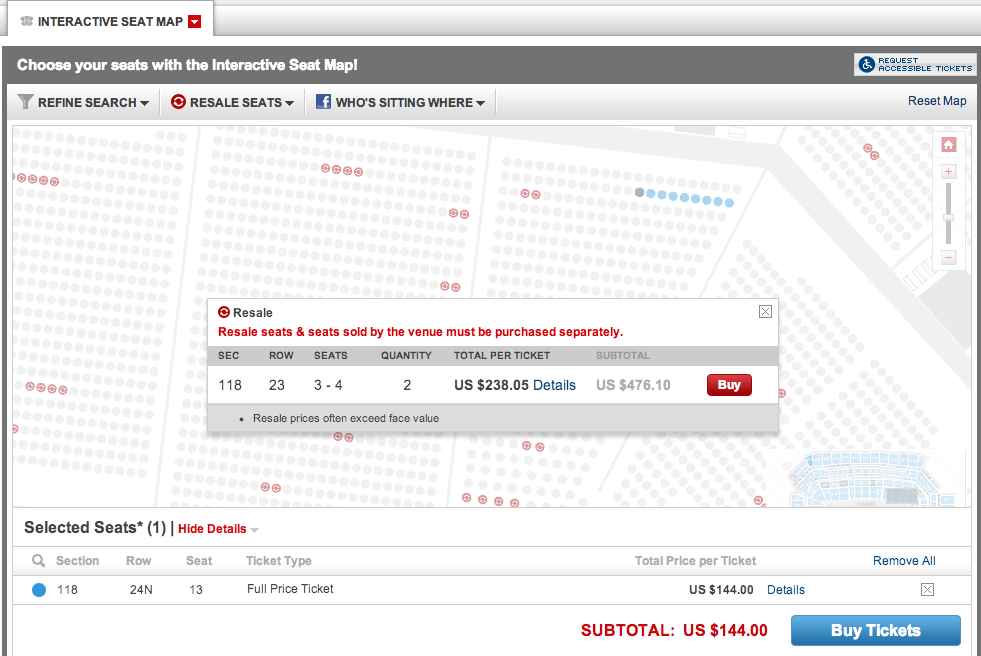Ticket scalping and concert profiteering have once again been thrown into the spotlight of music issues recently, especially given the furious demand for the Bruce Springsteen Australian Tour 2014.
Promoters Frontier Touring have attempted to fan the flames over the Springsteen tour after outraged punters found tickets to the nearly sold-out tour appearing for exorbitant prices online, while Frontier boss Michael Gudinski put out a personal plea for fans to be patient for more dates while cautioning fans “don’t be duped by scalpers.”
The issues over the Springsteen Tour also prompted Australian agents Ticketek and Ticketmaster to admit that scalpers, ticketing bots, and ‘purchasing syndicates’ had indeed snaffled up a large proportion of ticket sales.
Against this backdrop, in which fans are lousing out to online ticket touts and scalpers looking to profit from intense demand for popular music tours, Ticketmaster has quietly launched a new service that looks to take a bite out of ticket scalpers.
The American ticket agent has rolled out a new online service called TM+ that puts both new tickets and re-sale tickets into the one interface for punters purchasing tickets online. The service works by displaying an online map that distinguishes between seats for new tickets – selling at the standard retail price (plus booking fee) – alongside tickets that are being re-sold at a marked up price, such as front row priority positions.
Ticket holders who are looking to sell through TM+ (whether because they can’t make the event or for more nefarious reasons) are able to do so through an account with Ticketmaster online or through a mobile and smartphone platform. All transfers are made electronically between ticket holders, which also cuts out the need to send or print physical tickets in the mail.
(Image: An interactive map of a TM+ pass for an American football match.)
A report from LA Times notes TM+ has been used at over 300 events in America thus far, first launching with a Black Sabbath concert in August before being implemented in other sport and music events as part of a larger test phase of the program. Part of Ticketmaster’s $100m upgrade by owners Live Nation in their “arms race” against scalpers, TM+ is essentially trying to discourage consumers from hitting second-hand markets and resale sites, in which the ticketing agent misses out on any profits from the resale of tickets.
Love Music?
Get your daily dose of metal, rock, indie, pop, and everything else in between.
TM+ is designed to offer consumers greater choice, namely between splashing out for slightly better seats at greater cost or simply going for what’s available at a fare rate, with the profits from a resold ticket being split between Ticketmaster, the reseller, as well as the band who’s putting on the show.Ticketmaster is essentially trying to discourage consumers from hitting second-hand markets and resale sites, in which the ticketing agent misses out on any profits from the resale of tickets.
For a hypothetical example, if the TM+ service were to be implemented for the upcoming Bruce Springsteen Australian Tour 2014, fans of The Boss have the option of purchasing a prime seat available in the stalls for $227.65 retail, or instead go for a General Admission ticket for $300, marked up from the retail $227.90, but the $72-ish profit would be split between the seller of the ticket, Springsteen’s people, and Ticketmaster.
How do those profits split? Well details are vague but essentially the resale system would see Ticketmaster collecting around 20% of that profit – about half from the buyer and half from the seller – while sharing some of that fee with the band, unlike third-party reseller sites such as viagogo, or at sites like eBay or GumTree, in which the promoter and ticket agent make nothing.
Which brings about one question about ticket touts; would Ticketmaster care if they saw a scalper hypothetically re-selling off the entire front row of Springsteen’s show? Basically, no, because they still pocket a share of the cash from the touted ticket rather than worry about who’s selling it (let alone able to track the seller, as they’ve proven they’ve had difficulty doing in the past, never mind the messy accusations by Kid Rock that in a lot of cases its the musician themselves).
Ticketmaster and Live Nation are obviously hoping to take a larger share of the $4 billion that’s turned over yearly in the resale market, as the LA Times estimates, with a boost from TM+ putting Ticketmaster from 10% to 30% of that market in the next few years, resulting in about $300 million in revenue and in turn about $60 million in profit, according to Maxim Group John Tinker.
That $60m figure is one that American resale market leader StubHub, a division of eBay Inc, is already enjoying. “StubHub has done a great job in the space and Ticketmaster is finally stepping it up,” says Tinker of the new TM+ move, while StubHub President Chris Tsakalakis says that Ticketmaster is merely playing catch-up on the “superior customer service” the’ve been providing since 2002, that is ” more than triple Ticketmaster’s secondary ticket sales, remains the market leader, and we intend to keep it that way,” he confirms.
The news of TM+ follows Melbourne’s Palais Theatre taking the ticketing matter into its own hands, launching a new anti-scalping resale service that allows the exchange of tickets to sold out shows between punters, one of the first of its kind by a major concert venue in Australia.

































